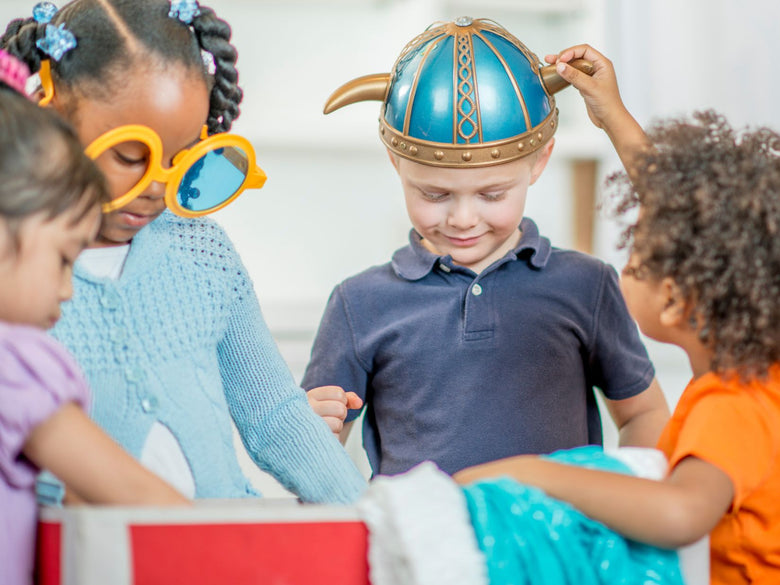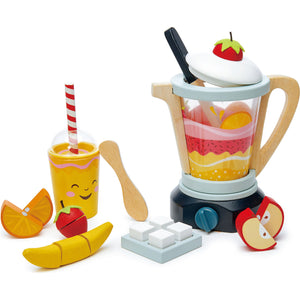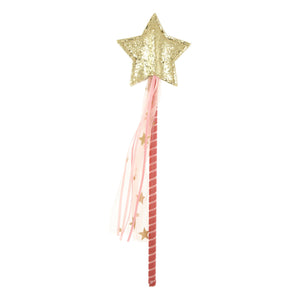By Kathryn Peck
I’ve been inside a lot of preschool classrooms over the years (I’m a mom of 4), but more recently I’ve been volunteering as a teacher’s aide in my son’s nursery school, so I’m in the classroom quite a bit more nowadays. In the classroom, and this will sound familiar in most nursery school classrooms, there are different spaces or centers set up. Some change weekly, others stay the same. There are costumes in one area, a kitchen with play food in another; one area has a cash register set up as a market stand, and there’s a sensory bin in the opposite corner. There’s also a gigantic container of cardboard building bricks, a toy tool box, a toy ironing board, and a furry black and white dog costume, which might just be the most popular toy in the classroom.
I truly think that if the teacher didn’t signal it was “clean-up time,” the kids would play in this way all day. And why not? Open-ended creative play is inexhaustible fun. But these make-believe scenarios do more than just keep little ones entertained, they actually serve as a crucial component in a child's cognitive, emotional, and social development.
I truly think that if the teacher didn’t signal it was “clean-up time,” the kids would play in this way all day.
Pretend play acts as a playground for the developing mind. When children engage in imaginative scenarios, they exercise their cognitive abilities by creating and manipulating mental representations of the world around them. They play house, astronauts, or builders, all the while honing their problem-solving skills, critical thinking, and creativity.
The world of pretend play can help children develop language skills. Through dialogue with their playmates, stuffed animals, or even imaginary friends, children refine these skills. They learn to articulate their thoughts, express emotions, and negotiate with others.
Through pretend play, children have the opportunity to explore and express their emotions in a safe and controlled environment. Whether they are playing the role of Elsa saving Arendelle (yes, still a popular costume in the classroom right now) or a veterinarian caring for animals, children learn to navigate their own emotions and understand the perspectives of others.
Pretend play is a social playground where children learn invaluable social skills. They practice cooperation, negotiation, and taking turns as they work together to create and enact imaginative scenarios. I see this a lot when kids begin building structures together with blocks or start role playing in the market area of the classroom, and children inevitably have to learn how to take turns when it comes to sharing the ever-popular furry black and white dog costume. They develop skills in problem-solving and conflict resolution through this type of play. These interactions enhance their ability to understand social cues, establish friendships, and develop a sense of teamwork.
Through pretend play, children have the freedom to experiment with different roles, identities, and scenarios. This experimentation allows them to discover and express their own personalities, preferences, and interests, and it fosters their own sense of independence. Whether they are pretending to be a chef, a firefighter, or a magical creature of some kind, children develop a sense of self and gain confidence in expressing their individuality.
This play time is perhaps my favorite part of each morning in the nursery school classroom, and while it might look like just free time, it is a powerful tool for childhood development. As parents, we should remember this and encourage the magical world of pretend play, recognizing its profound impact on shaping the well-rounded individuals of tomorrow.
-
About the author: Kathryn is the owner of Bicycle Pie and mom of 4 little ones. Also a writer, editor, and former owner of one of Boston's premiere baby boutiques, she continues to write about motherhood, children's products, family life, and all other things that test our skills and patience as parents.






